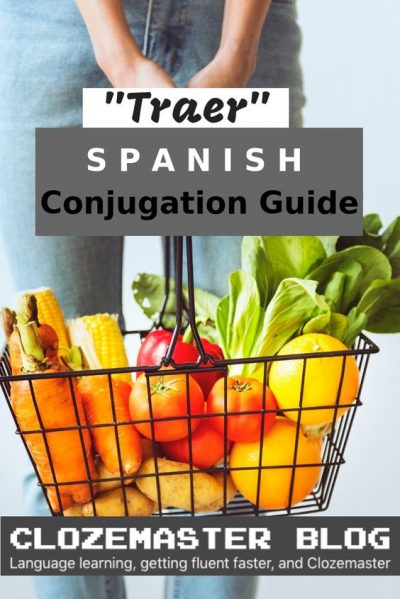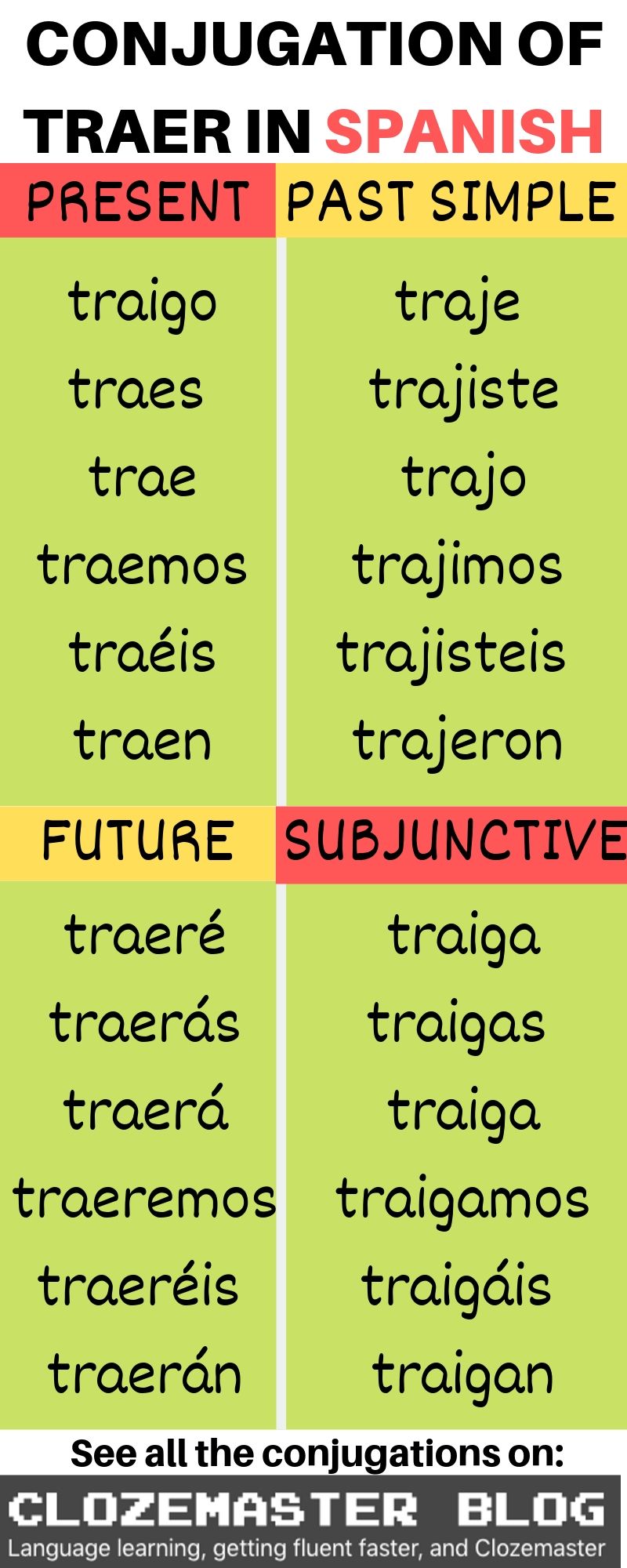The Spanish verb traer (to bring) brings us tons of questions: what is the meaning of traer? How do I conjugate traer? What are the uses of the verb traer? Well, you’ve come to the right place!
Welcome to your Crash Course on Traer! Today, we are going to 1) certify you in all meanings and of the Spanish verb traer, 2) introduce you to all the verb tenses of traer, and finally 3) include practical real-world experience to get you speaking ASAP!
We have laid out your curriculum in the following tenses:
BEGINNER (Undergrad)
1. I bring (yo traigo)
2. I brought (yo traje)
3. I will bring (yo traeré)
4. I used to bring (yo traía)
INTERMEDIATE (Masters)
5. If I brought, I would bring… (si trajera, traería…)
ADVANCED (PhD)
6. If I had brought, I would have brought… (si hubiera traído, habría traído…)
Let’s hit the books!

6 Different Uses of the Spanish Verb Traer in English
In this section, we will talk about the different uses of the Spanish verb traer, so that you won’t get lost in the example sentences below!
1. To bring
Voy a traer una botella de vino.
I am going to bring a bottle of wine.

|
CAREFUL! People often confuse “to take” (llevar) with “to bring” (traer). The difference is similar to the difference between ir and venir: it has to do with the mental location of the person to whom you are talking. Te traigo agua versus te llevo agua: they both mean “I’ll bring you water” but one conveys the idea that you are already mentally near that person even if you are physically far away, and the other conveys the idea that you’re far away. For more on the tricky peculiarities of llevar vs. traer, check out this amazing article! |
2. To carry
Desafortunadamente no traigo dinero.
Unfortunately, I have no money on me.

3. To wear (or be dressed in)
¿Qué traes esta noche?
What are you wearing tonight?

4. To provoke (or cause)
Las obras viales trajeron muchos problemas de tráfico.
The roadwork caused many traffic problems.

5. To have (or contain)
La revista no trae fotos.
The magazine doesn’t have any pictures.

6. Traer(se) (to bring with oneself)
Me traje dos libros para el viaje.
I brought with me two books for the trip.

Spanish Conjugation of Traer: Beginners Level
In Beginners traer, we will start with the easy tenses that you use every day (I bring, I brought, I will bring, I used to bring…). Then we’ll look at example sentences using one conjugated verb.
The Present, Preterite, Future and Imperfect Traer
*Irregular in green
| Subject | Present | Preterite | Future | Imperfect |
| yo | traigo | traje | traeré | traía |
| tú | traes | trajiste | traerás | traías |
| él, ella, Usted | trae | trajo | traerá | traía |
| nosotros | traemos | trajimos | traeremos | traíamos |
| vosotros | traéis | trajisteis | traeréis | traíais |
| ellos, ellas, ustedes | traen | trajeron | traerán | traían |
OJO! Traer has two irregularities which need to be memorized:
- The traer conjugation for yo, which is important because it is used again in the present subjunctive (yo traiga);
- The traer conjugation in the preterite, which is important because it used again in the imperfect subjunctive (yo trajera).
Example Sentences Using Spanish Verb Traer in Present, Preterite, Future and Imperfect Tenses
Let’s put the conjugation table into practice. Check out these example sentences:
- No puedo ir, no traigo dinero! (I can’t go, I don’t have money on me!)
- Trajiste tu disfraz? (Did you bring your costume?)
- Todos traeremos bebidas a la fiesta. (We will all bring drinks to the party.)
- Cuando estaba en la escuela, siempre traía comida de la casa. (When I was in school, I would always bring food from home.)
Listen up!You can have everyday conversations with these four tenses, and you only need to use one per sentence! This is the easiest sentence structure, so make sure to master these first! |
Spanish Conjugation of Traer: Intermediate Level
In Intermediate traer, we move from one conjugated verb per sentence to two. We cover the imperfect subjunctive and conditional that enable us to talk about hypothetical situations in Spanish.
The Imperfect Subjunctive Traer and Conditional Traer
*Irregular in green
| Subject | Imperfect Subjunctive (If I) brought… |
Conditional (I) would bring… |
| yo | trajera | traería |
| tú | trajeras | traerías |
| él, ella, Usted | trajera | traería |
| nosotros | trajéramos | traeríamos |
| vosotros | trajerais | traeríais |
| ellos, ellas, ustedes | trajeran | traería |
A Match Made in Heaven: Imperfect Subjunctive and Conditional
As mentioned in our sister crash courses on the verbs dar and poner, imperfect subjunctive & conditional are a match made in grammar heaven, total BFFs.

The most common example is the following: What would you do with a million bucks? In a hypothetical situation, you might say:
“If I had a million dollars, I would buy a castle”
Imperfect subjunctive: had
Conditional: would buy
For the verb traer, the imperfect subjunctive is brought (trajera), and the conditional is would bring (traería). Now, let’s get to dreaming about some hypotheticals!
Example Sentences Using Spanish Verb Traer in Imperfect Subjunctive and Conditional Tenses
The following sentences show how the BFF verbs from above form hypothetical sentences. The if of the hypothetical is highlighted in red:
- (Yo) traería a mis hermanos** si (ella) trajera a los suyos. (I would bring my brothers if she would bring hers.)
- Si (yo) trajera a ella aquí, (ella) traería tantos problemas. (If I brought her here, she would bring/cause so many problems.)
- Si (ellos) trajeran maquillaje gótico, (ellos) traerían desgracia a la familia. (If they wore gothic make-up, they would bring shame to their family.)
**If you want to bring someone with you, you must use the preposition “a” (traer a alguien)
Important Detail!There is another sentence structure with the imperfect subjunctive: Preterite (Beginners) + Imperfect Subjunctive (Intermediate) For example, when someone makes a command or expresses a desire, we realize this calls for the subjunctive. In reported speech in the past, i.e. “he told me to bring it”, you would say: Me dijo que lo trajera. For more on imperfect subjunctive in the past, check out this sweet article! |
Spanish Conjugation of Traer: Advanced Level
In advanced traer, we cover more advanced conjugations: past perfect subjunctive and perfect conditional. We will break down the meanings of these tenses and add example sentences that you can memorize or make your own!
The Perfects: Past Perfect Subjunctive and Perfect Conditional
*Irregular in green
| Subject | Past Perfect Subjunctive (If I) had brought… |
Perfect Conditional (I) would’ve brought… |
| yo | hubiera traído | habría traído |
| tù | hubieras traído | habrías traído |
| él, ella, Usted | hubiera traído | habría traído |
| nosotros | hubiéramos traído | habríamos traído |
| vosotros | hubierais traído | habríais traído |
| ellos, ellas, ustedes | hubieran traído | habrían traído |
In advanced Spanish, we move up from two verbs per sentence to four!

A Breakdown of the Shoulda Coulda Wouldas of Spanish
The shoulda coulda wouldas of Spanish, as seen in sister articles dar and poner, are the perfect combination of perfects: past perfect subjunctive + perfect conditional.
“Si hubiera traído, hubiera dicho, si hubiera hecho…”
(If I had brought, if I had said, if I had done…)
“Yo habría traído, habría dicho, habría hecho…”
(I woulda brought, I woulda said, I woulda done…)
In these tenses, we use the auxiliary verb haber (to have) + the verb traer in it’s past participle (traído). (Click here for Spanish Past Participles and Lazy Grammar Hacks!)
We love using perfect tenses because we just need to know how to conjugate haber. This is an example with the verb traer, but any verb can follow this pattern.
Example Sentences Using Spanish Verb Traer in Past Perfect Subjunctive and Perfect Conditional
Take a look at these advanced examples of traer below!
- Si el Shake Weight nos hubiera traído algún beneficio, (yo) te lo habría traído a ti. (If the Shake Weight had given us some kind of benefit, I would have brought it to you.)
- Si (yo) hubiera traído menos pan al picnic, (ella) no habría traído tanta mermelada. (If hadn’t brought so much bread, she wouldn’t have brought so much marmalade.)
- (Yo) habría traído a mi mamá si (ellos) hubieran traído una silla de ruedas. (I would’ve brought my mom along if they had brought a wheelchair.)
Wrapping Up the Crash Course
You made it! You brought your best game (trajiste tu mejor!) and we’re proud of you!

Today, your degree covered:
- Six of the most important meanings of the Spanish verb traer
- Four easy conjugations (traigo, traje, traeré, traía…)
- Two intermediate conjugations (trajera, traería…)
- Two advanced conjugations (hubiera traído, habría traído…)
But before you spread your wings and are ready to take on the world, check your traer skills with Clozemaster!
Adiós y hasta la proxima amigos!
Click here to read our comprehensive guide to all Spanish tenses!
Challenge yourself with Clozemaster
Test your skills and see what you’ve learned from this article by playing a selection of sentences with various expressions employing the Spanish verb traer:
Sign up here to save your progress and start getting fluent with thousands of Spanish sentences at Clozemaster.
Clozemaster has been designed to help you learn the language in context by filling in the gaps in authentic sentences. With features such as Grammar Challenges, Cloze-Listening, and Cloze-Reading, the app will let you emphasize all the competencies necessary to become fluent in Spanish.
Take your Spanish to the next level. Click here to start practicing with real Spanish sentences!



